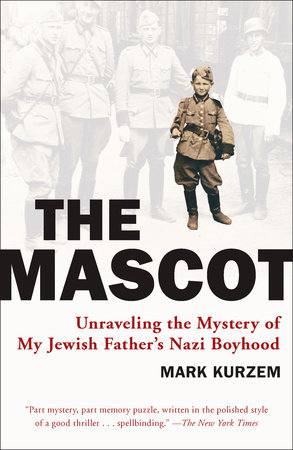The Mascot Reader’s Guide
By Mark Kurzem


INTRODUCTION
The Mascot: Unraveling the Mystery of My Jewish Father’s Nazi Boyhood tells an incredible story of survival and identity. Mark Kurzem was happily ensconced in his academic life at Oxford when his father, Alex, appeared on his doorstep with a terrible secret. After escaping a Nazi death squad that murdered his family, he was adopted by a group of Latvian SS soldiers. Alex was able to hide his Jewish identity and make himself useful to the soldiers, becoming their mascot and a “corporal” in the SS. He eventually escaped and moved to Australia, where he hid this horrific part of his past from his closest friends and family. The Mascot tells the story of how Alex enlists the help of his son to uncover his astonishing past.
With Mark’s help, Alex begins to recall how he evaded the German-led execution squad that decimated his village one horrible winter night. After witnessing the murder of his Jewish mother and siblings, Alex escapes into the woods where he scavenges for food, stealing clothing from the bodies of dead soldier to survive. He’s eventually discovered by a group of Latvian soldiers who adopt him as their mascot. Alex accompanies the unit everywhere as it changes its identity and duties to those of an SS unit on the rampage. He even appears in propaganda films and newspaper articles, riding into Riga in a military parade.
At the age of five, was Alex Kurzem a Nazi collaborator or just a lost little boy?
What begins as a personal narrative of survival from World War II grows into a larger portrait of faith, memory, identity, and a bond between father and son. In order to reclaim the identity that the Nazis stole from him, Alex must untangle the mythology he created in order to survive. Their journey to uncover his past—speaking to historians, bureaucrats, and members of Alex’s biological, Ukrainian Jewish family—reveals a terrifying look inside the belly of the Nazi beast through the eyes of a Jewish child. It is a survival story, a grim fairy-tale, a memory puzzle, and a compelling psychological drama of the Holocaust.
Mark Kurzem grew up in Melbourne, Australia. He studied anthropology at the University of Oxford, where he was a Commonwealth Scholar, and also studied at Melbourne, Jochi, and Tokyo universities, where he was a Monbusho Research Scholar; his academic research focused on Japanese society. He has worked in the fields of political research, international relations, teaching, and filmmaking in Japan, Australia, and the United Kingdom. He was also an international relations adviser to the mayor of Osaka. In 2002, he coproduced and wrote a documentary about his father’s life, also titled The Mascot, which was the subject of international attention. He lives in Oxford.
Just for joining you’ll get personalized recommendations on your dashboard daily and features only for members.
Find Out More Join Now Sign In